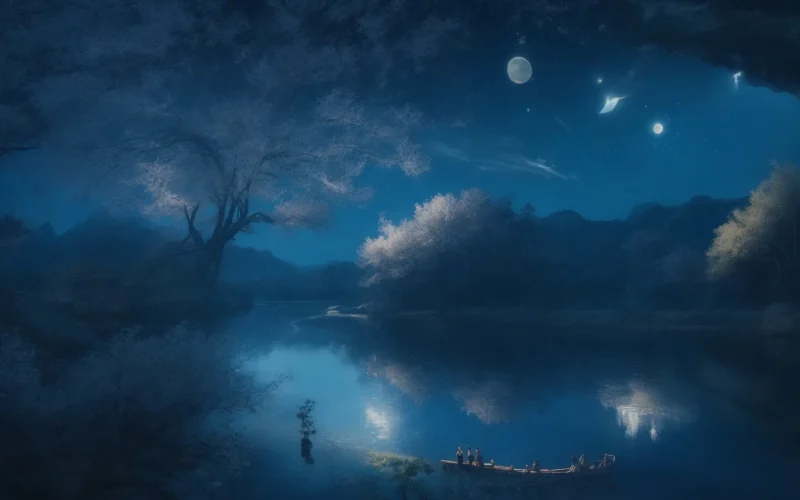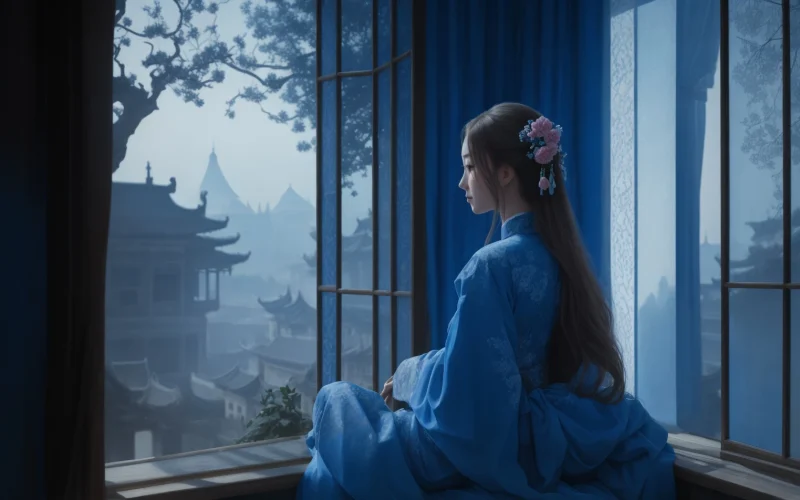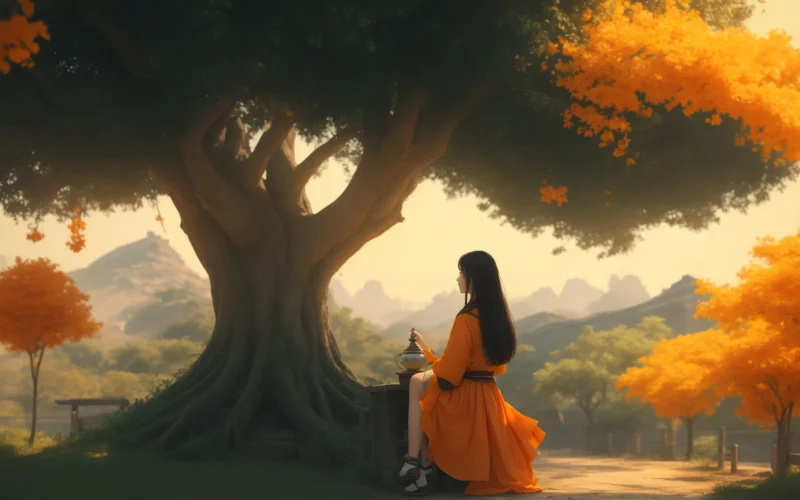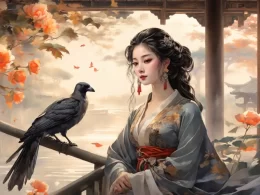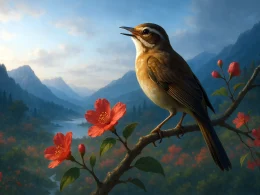A bridge flies away through a wild mist, Yet here are the rocks and the fisherman's boat. Oh, if only this river of floating peach-petals Might lead me at last to the mythical cave!
Original Poem
「桃花溪」
张旭
隐隐飞桥隔野烟,石矶西畔问渔船。
桃花尽日随流水,洞在清溪何处边。
Interpretation
This poem, composed by the renowned calligrapher Zhang Xu, draws upon the artistic conception of Tao Yuanming's "Peach Blossom Spring" to create an ethereal realm where reality and imagination intertwine. Through the fusion of realistic description and fantasy, it evokes readers' yearning for a reclusive life akin to that utopian paradise. The Peach Blossom Stream, an actual waterway located in Taoyuan County, Hunan Province, serves as the geographical setting for "Peach Blossom Spring." Zhang Xu uses this historic site to express his emotions, projecting an ideal realm onto real landscapes to convey his inner pursuit of tranquil detachment from worldly clamor.
First Couplet: "隐隐飞桥隔野烟,石矶西畔问渔船。"
Yǐn yǐn fēi qiáo gé yě yān, shí jī xī pàn wèn yú chuán.
A faint flying bridge spans the wild mist,
By the western rock ledge, I ask a fishing boat.
The opening lines construct a mysterious riverscape. The bridge "faintly" visible through "wild mist" suggests a boundary between reality and dreamscape, reminiscent of the fisherman's initial hazy encounter with the peach blossom grove in Tao Yuanming's tale. The act of "asking a fishing boat" reveals the poet's active quest for this idealized realm, skillfully connecting physical landscapes with spiritual yearning to create profound artistic conception.
Second Couplet: "桃花尽日随流水,洞在清溪何处边?"
Táo huā jìn rì suí liú shuǐ, dòng zài qīng xī hé chù biān?
Peach blossoms drift with flowing water all day long—
Where along this clear stream lies the hidden cave's mouth?
This couplet seamlessly blends scenery and emotion. "Peach blossoms drifting with the current" recreates the "falling petals in profusion" imagery from the original tale, presenting an intoxicating, dreamlike vision. Yet unlike Tao's fisherman who followed the stream to its utopian source, the poet finds himself questioning the cave's location. This inquiry transcends geographical search to become spiritual pursuit—condensing within one line his longing for an ideal world, reclusive living, and soul's repose.
Holistic Appreciation
Zhang Xu's poem takes Tao Yuanming's Peach Blossom Spring as its spiritual core, using the physical Peach Blossom Stream (Taohua Xi) to allude to the mythical Peach Blossom Spring (Taohuayuan), constructing an ethereal, dreamlike utopia. Through imagery—a soaring bridge, wild mist, rocky banks, fishing boats, and peach blossoms adrift on flowing water—the poet creates a hazy yet profound beauty, interweaving real landscapes with an idealized vision. His brushstrokes move from distant vistas to intimate details, shifting from concrete to abstract, before culminating in the act of asking ("Where does the stream lead?") and seeking ("Is this the entrance to that fabled grove?"), channeling emotion into a deeply personal yearning. Though just four lines, the poem unfolds in layers, winding and reflective, like a slow-burning spiritual journey.
Artistic Merits
This poem blends scenery and aspiration, crafting an ideal realm through the interplay of reality and illusion.
Languid yet evocative diction: Phrases like "faintly visible," "wild mist," and "all day long" are painterly and poetic, rich with lyrical understatement.
Progressive structure: It moves from scene to mood, mood to thought, its unhurried rhythm deepening the contemplative atmosphere.
Subtle allusion: The poem honors Peach Blossom Spring without overt mimicry, transcending homage to achieve its own mythic resonance. By posing questions—to the fisherman, about the cave’s mouth—Zhang dissolves boundaries between present and past, reality and fantasy, voicing his longing for reclusion.
Insights
Beyond depicting nature’s beauty, this poem channels humanity’s timeless search for ideals, peace, and freedom. The Peach Blossom Spring endures as China’s archetypal utopia, embodying the desire to escape turmoil and return to simplicity. Through it, Zhang Xu expresses his own eremitic spirit, reminding us: amid life’s clamor, we must preserve hope for a purer world, never abandoning the quest for our own "streamside sanctuary." Such dreams dwell not only in ancient fables but also in the hearts of all who yearn for serenity.
Poem translator
Kiang Kanghu
About the poet
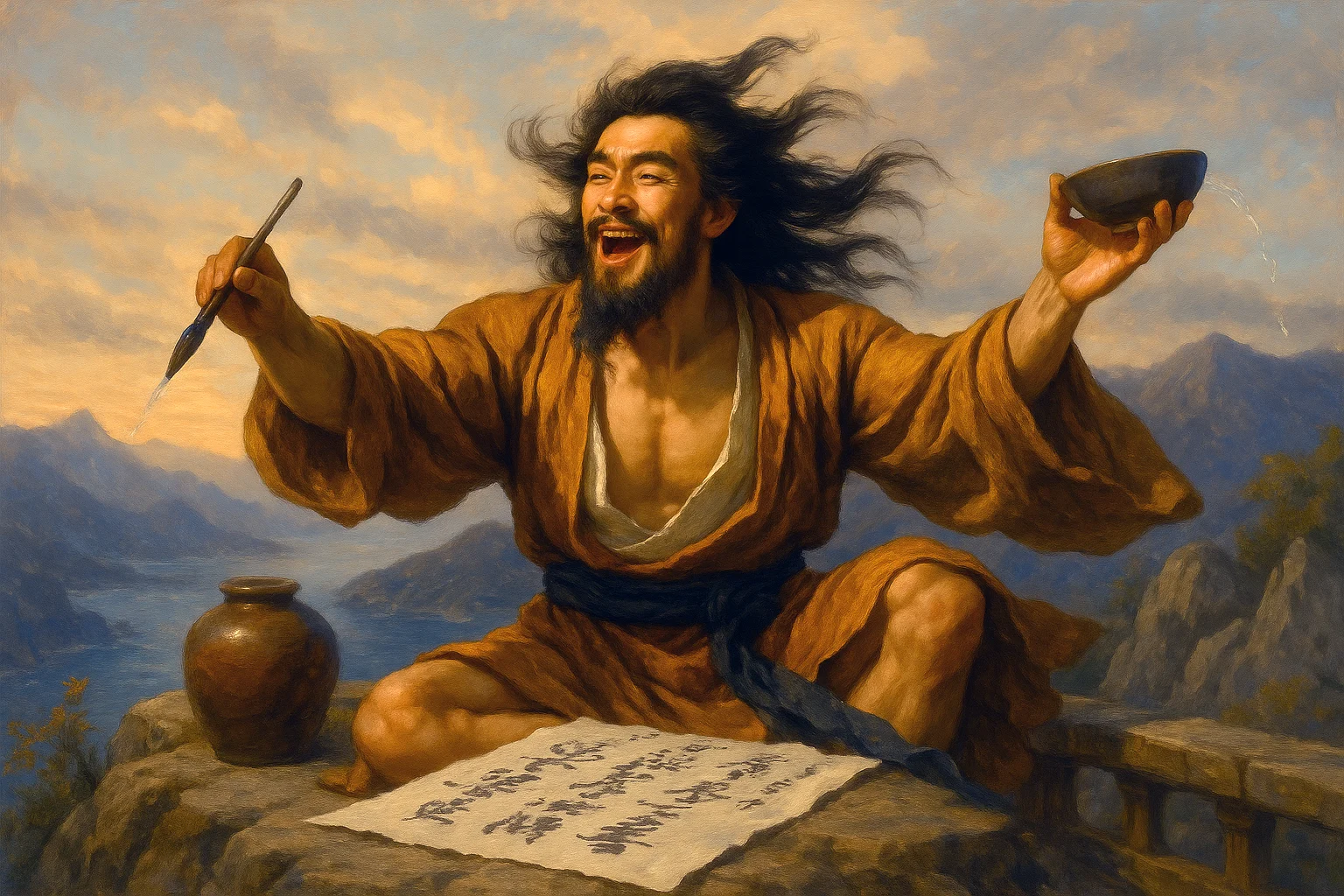
Zhang Xu (张旭, c. 675 - 750), a native of Suzhou, Jiangsu, was a High Tang calligrapher and poet. Renowned as the "Sage of Cursive Script" (caosheng), he left only six surviving poems. A lover of wine and wild cursive calligraphy, he fused poetry, calligraphy, and intoxication in his artistic practice, embodying the Romantic spirit of the High Tang. His work profoundly influenced later literati art.






